Dispatch from St. Petersburg
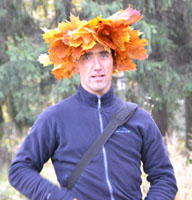
Dr. Kirill Skomorovski 288
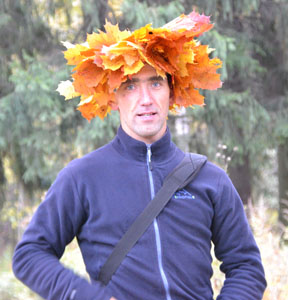
Photo by Victor Skomorovski
Dr. Kirill Skomorovski practiced veterinary medicine in Russia for 15 years, working as a house-call veterinarian and in standing clinics. In the photo, taken last fall during a walk in the park with his son, Skomorovski donned a wreath of maple leaves he'd found on the ground.
Dr. Kirill Skomorovski is a veterinarian in Russia. In 15 years of practice, primarily in Kaliningrad at the west end of the country, he provided care chiefly to dogs and cats, and sometimes to horses, birds, exotic animals and the occasional marine mammal.
Two years ago, Skomorovski moved to the metropolis of St. Petersburg, where he lives with his 10-year-old son in an apartment in a middle-class neighborhood filled with schools, supermarkets and entertainment centers. Last year, Skomorovski, 43, stopped practicing in order to look after and homeschool his son, Victor, full time. He hopes in time to become a primary-education teacher.
Skomorovski described his view from St. Petersburg on the COVID-19 health crisis.
The pandemic has been unfolding for nearly six months now. How is it affecting Russia at this time?
Here are the official counts [which, as of today, show 221,344 cases and 2,009 deaths]. The main trend I see is the following: The pandemic started to unfold in Russia in the second half of March. The number of infected people grew exponentially (although not very fast) until mid-April. Then, the exponential growth stopped. It slowed about 20 days from the beginning of the exponential phase, like in other countries, and I personally was glad to see the pandemic in Russia following the usual scenario, which would mean it should cease soon. Unfortunately, the growth speeded up again about a week ago. It means probably that it is too early to calm down. The good news is that the mortality rate is rather low, less than 1%. However, one should be somewhat doubtful [of] using official statistics in Russia.
Based on the official figures, COVID-19 arrived in Russia well after it appeared in many other countries. How do you think the country managed to avoid the onset of cases for so many weeks?
Two possible reasons are likely in my opinion: (1) Just by chance, the sufficient number of infected people entered Russia later than happened in other countries. (2) It took more time to start to diagnose people infected with COVID-19 in Russia than in other countries.
Grocery store shopper 288
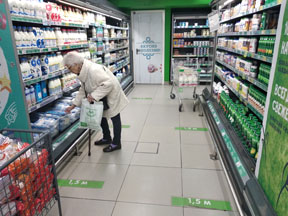
Photo by Dr. Kirill Skomorovski
As a guide for shoppers to stay separated from one another, stores have added floor markers indicating 1.5-meter distances, or about 5 feet.
The second scenario looks more likely, considering the rather sad condition of medicine in Russia. On the other hand, the second scenario should lead to more rapid growth of the number of infected and diagnosed people once they started to make proper diagnoses, a trend that is not reflected in the official statistics. So I'm very uncertain about my hypotheses.
What measures have government authorities taken to slow transmission and otherwise respond to the pandemic?
The measures are numerous. I'll describe the situation as far as I know it. Movement in and out the country is prohibited. Movement inside the country is very restricted. Officially, nobody is allowed to go outside of his home for any reason but to purchase something in the closest food store or pharmacy or to walk with the pet. And even this — not farther than 100 meters [328 feet] from home. If you go farther than 100 meters from your home you have to have written permission proving that you have a special reason for this. Visiting parks, forests, countryside is also prohibited.
Many big and small companies were closed. Many employees work remotely from home. The companies that have permission to work in a usual way issue the written permissions for their employees. These rules (about going no farther than 100 meters from home, etc.) certainly concern infected people and those who came from abroad. I'm uncertain whether this rule is applied to other people, as well.
In addition, most public places that continue to work (supermarkets, post offices, banks, etc.) have special lines on the floor to keep a distance of 1.5 meters [about 5 feet] between people. They remind customers, using speakers, to keep their distance, use face masks, hand disinfectants, etc. They claim that all their employees undergo thermometry daily.
Open hours of underground public transit were shortened and some bus lines were stopped.
Post office line 288
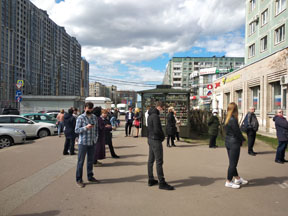
Photo by Dr. Kirill Skomorovski
People waiting to enter a post office space themselves apart in an effort to avoid transmitting or catching the novel coronavirus.
Government-run schools (both general and specialized like music schools) were forced to provide remote education. Private schools, sport schools and similar organizations were closed. They were not obligated to provide remote education but most of them do, mostly by email or WhatsApp; sometimes through Zoom.
Are the restrictions on movement enforced? If so, how?
As far as I can see, it is not enforced. Somebody heard from somebody that somebody was stopped by police and asked about the reason for being far from home and authorization for this. However, I personally have not been stopped, I have not seen police stopping anybody and I have no direct information from people who have been stopped.
I personally know people who were forced to leave a forest immediately when this rule was instituted. However, I think the reason the police acted was that the people were activists trying to defend the forest from destruction by someone who had bought the land illegally and planned to build there.
I have heard several times about people who were punished with big penalties for violating the rules. The penalties are noticed in official documents.
How large are the penalties?
From 4,000 to 40,000 rubles (USD$55 to USD$550). For perspective, the official mean salary in St. Petersburg is about USD$800 per month (although my impression is that it is actually much lower, closer to USD$400).
How have people responded to the government directives?
Generally, the opinions are polarized enough. Some people think that the governmental measures are justified; however, most think that they are excessive.
St. Petersburg subway station 288
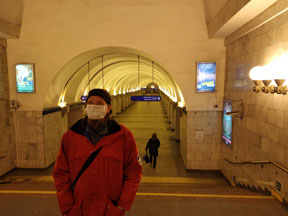
Photo by Dr. Kirill Skomorovski
Because of the pandemic, a subway station is nearly empty during what would have been a morning rush hour. Vladislav Stain, a friend of Dr. Kirill Skomorovski, wears a mask, but that's not the norm.
Some people believe that the pandemic and the coronavirus are not real and everything that is happening now in the world is organized intentionally by somebody: secret world government, Masonic Lodge, Americans, Chinese, Jews or Russian oligarchs, etc. Some people think that although the pandemic itself is real, the virus was intentionally created by the same secret people. However, the majority agree that the virus and the pandemic are real and unintentional but the panic that was created about it by mass media and the excessive measures taken by governments are intentional and are used by those who are ruling for their benefit.
Have activities in your neighborhood changed as the case count has risen?
The governmental directives are not followed strictly. Many companies continue to work even though their activity is not essential, like construction or information-technology development.
There are noticeably fewer people outside, especially in the underground, until the very end of last month. Since then, many more people are walking outside again, but still much less than before the pandemic. I don't know if this is due to the wonderful warm weather or the people just cannot stay indoors anymore.
I think that no more than one-third of people use face masks outside. Although people in large supermarkets keep a distance, those who go to economy-class food stores don't.
Have veterinarians in your community changed how they practice in response to the pandemic? If so, in what ways?
I heard that there are clinics that practice remote consultation. I have no accurate information on this, however.
Those who practice in the usual mode report the following: The general number of patients decreased but not very dramatically. However, the proportion of different reasons the clients come to the clinic changed. Non-urgent surgeries, like neutering, decreased. Some clinics asked their clients to avoid non-urgent visits. However, the number of vaccinations increased. Probably during the pandemic, owners are more concerned about preventing infectious diseases in the pets or they just have more time to visit the clinic. In addition, the number of hit-by-car patients decreased.
In what ways, good or bad, are pets affected by the pandemic?
I think the first effect of the pandemic on the domestic animal is good — they are more observed, they spend more time with their owners, dogs walk more. However, the long-term effect may be bad, since people are going to be impacted economically, so they will spend less money on their pets.
Has your daily life changed as a result of the pandemic?
Kirill and son 288
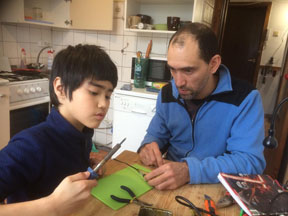
Photo by Sasha Tesakova
Victor Skomorovski (left) does a repair job using solder, with help from his dad. A practicing veterinarian until last year, Dr. Kirill Skomorovski has turned his full-time attention to parenting and schooling his son from home. Consequently, their daily routines are little changed by the coronavirus pandemic.
Since I did not work before the pandemic and my son did not go to school [outside the home], our life did not change dramatically. We stopped going to our sport lessons and some other outside activities. That's all.
Do you feel that you or any family members or close friends are personally vulnerable to COVID-19?
I feel that everybody is vulnerable to COVID-19 and that old people (including my parents) are at greater risk for complications. I heard some fearful complaints from my ex-wife and from one of my friends. However, these somewhat panicky moods passed quickly. Other members of my family and my friends don't look fearful. I personally don't feel that this risk drastically changes my own life.
Do you know anyone who has or had COVID-19 or an illness resembling it?
I just learned from a friend that a friend of hers died from COVID-19, and the son of the woman who died was infected but recovered.
Earlier, another friend's son was suspected to have COVID-19 and was hospitalized. However, he was diagnosed negative and recovered completely.
Are you surprised by anything that has happened during this emergency situation?
I was surprised how many activities efficiently passed to the remote way, either online and offline. School education, music study, sport lessons, reading books in groups, even celebrating birthdays with friends through Zoom. It turned out to be even somewhat advantageous: One doesn't have to spend time to get to another place to meet somebody. People who live really far from each other and could not meet other way can meet online. One can continue to do his/her own jobs while participating in online meetings, courses, etc. People even spend less money and time on clothes, hairstyle and makeup.
Any other observations about the pandemic or people's reflections on it?
Many people say that we don't have to participate in the panic about coronavirus. I personally don't notice any serious panic around.
Also, many people say that this pandemic marks a critical point in social, economical, political and even ethical changes for all of humanity.